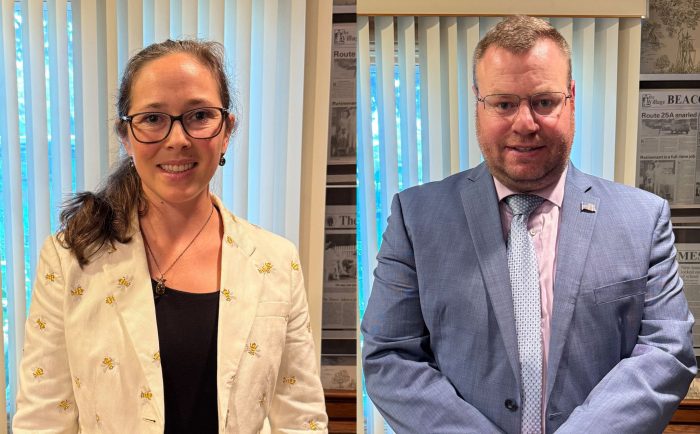Ed Flood and Rebecca Kassay: Candidates for NYS Assembly, 4th District
By Peter Sloniewsky
In a recent debate at the TBR News Media office, New York State Assembly District 4 incumbent Ed Flood (R-Port Jefferson) and challenger Rebecca Kassay (D-Port Jefferson) highlighted their concerns regarding affordability, personal experiences in local and statewide government and their varying views on some hot-button issues. District 4 comprises Stony Brook, Setauket, Old Field, Poquott, Port Jefferson, Belle Terre, Port Jefferson Station, Terryville, Coram and Gordon Heights.
Ed Flood

Incumbent Flood, a first-term assemblyman, previously worked as chief of staff to then-Assemblyman Dean Murray (R-Patchogue) and as assistant town attorney for the Town of Brookhaven and, until recent disbarment, ran his own law firm in Port Jefferson. In his opening statement, Flood, born in Port Jefferson Station, described a “mountain of extreme, high taxes” that he feels take away from the “dream” of Long Island life that inspired him to raise his family here. Flood’s platform largely revolves around his intention to “clamp down what we spend our money on,” and he casts himself as a vocal fiscal conservative in Albany.
Rebecca Kassay
Democratic challenger Kassay highlighted her experiences in local politics and as a small-business owner. Describing a need for “proactive public servants,” Kassay depicted her experiences working with environmental issues as indicative of her effectiveness in uniting layers of government. Moreover, as co-founder of The Fox and Owl Inn, a Port Jefferson small business, Kassay has cast herself as being in a unique position to understand local affordability issues. She served as a trustee of Port Jefferson Village from 2020, including a spell as deputy mayor, before dropping out this year to run for the Assembly.
Crime issues

Beyond his fiscal conservatism, Flood highlighted crime issues as a basis of his campaign. In addition to his opposition to bail reform passed in Albany, he made the claim that a decrease in overall crime has been counteracted with a general movement away from punishment for more petty crimes. Without punishment for such crimes, Flood argued, a small group of individuals are motivated to continue committing them. He also argued that the state Legislature is largely unresponsive to his concerns — that due to the Democratic legislative supermajority, Republican concerns over more controversial issues can go unheard and many processes of government can go on in secret.
This led into a major subject of the debate in governmental transparency. Kassay responded that she had been irritated with Flood’s purported narrative that crime had increased, but that she was willing to increase the number of opportunities for police to interface with legislators in Albany. Moreover, Kassay made a case that her more extensive local government experience had prepared her to better deal with such concerns, and that her platform was better suited to bring more voices to the table.
Flood’s disbarment as an attorney
This race includes controversy, as Flood was recently disbarred as an attorney. He claimed it was no fault on his part, and that he had almost entirely stopped practicing law due to his work in the Assembly, describing the timing of the process as “funny.” Kassay dissented from that description.
Candidate intentions
Both candidates presented themselves as largely concerned about affordability, but dissented in their perception of the current Democratic administration in Albany.
Flood claimed that “Albany has lost its way,” and presented himself as a vocal advocate for Republicans in state government. He said he was already positioned influentially on important committees and a willing bipartisan only interested in the public good.
Alternatively, Kassay emphasized her experience at the local levels of government and in community service, prioritizing better constituent service and looking forward to “greater results” than what she’s already accomplished.







